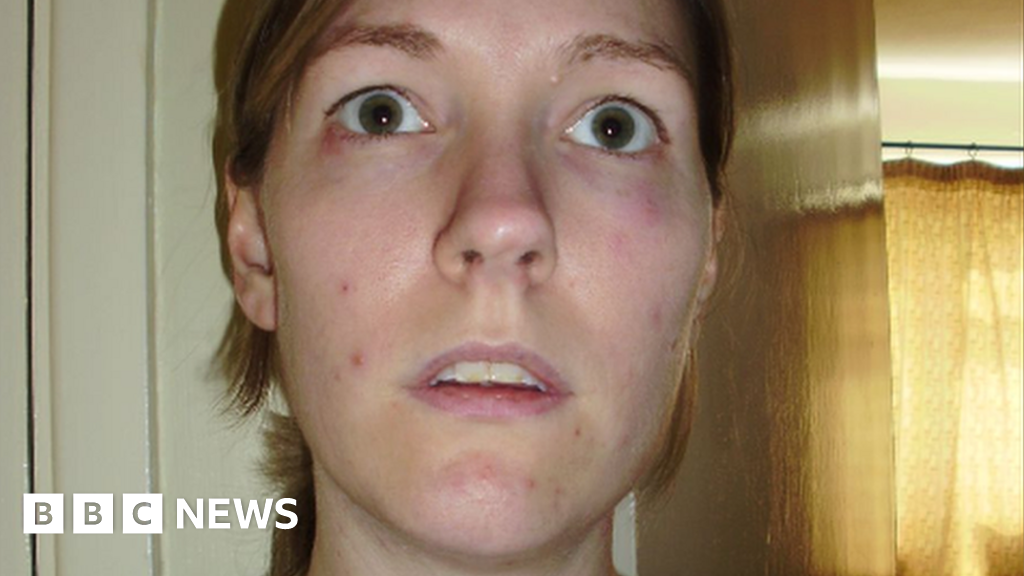[ad_1]
- By Meleri Williams
- BBC News
Image source, Rachael Humphreys
Rachael Humphreys said a flare up of the disease leaves her in “horrendous pain”
A mother with a “debilitating” rare disease has said psychological support for people with uncommon conditions is lacking.
Rachael Humphreys, 42, from Caerphilly, was diagnosed with Behçet’s disease almost 20 years ago.
She said the syndrome caused “horrendous pain” and affects her eyes, skin and joints.
The Welsh government said addressing the mental health needs of patients with rare diseases was “fundamental”.
Ms Humphreys said: “When it flares up it’s really aggressive and it absolutely knocks me off my feet.
“You do need a lot of input from specialists because it can affect so many different areas of your body.”
She has seen many specialists in Wales, but said there was a gap in mental health support.
She takes medication to control her anxiety, but said she has never been offered counselling.
Rachael Humphreys described the symptoms of Behçet’s disease as “debilitating”
“When you get diagnosed with a rare disease, or any kind of chronic health, you go through this grieving process,” she said.
“Because you’ve lost your health, really, you’ve just been left to deal with a disease that’s stampeded into your life.
“When you have a flare up that’s, for me, when I go into really intense grief. Because you’re in horrendous pain, but also because you’re realising your body doesn’t work properly.”
Ms Humphreys said due to a “lack of support” she had set up her own group for people with Behçet’s disease, which has about 50 members from Wales.
“In Wales, we don’t have that specialist approach to Behçet’s, we don’t have that coordinated approach. It’s about me having to try and signpost myself where they need to go”, she said.
Prof Iolo Doull stressed the collective affect of rare diseases
Prof Iolo Doull, chairman of the Rare Diseases Implementation Group in Wales, said about 170,000 people in Wales were affected by rare diseases.
“I think we need to recognise that some diseases are so rare that perhaps maybe there are only 10 people in the whole of the UK with that”, he said.
“So if there are a number of patients in Wales, obviously we would aim [that care is] delivered as close to home with as much quality as possible. But sometimes we have to recognise that people will travel across the UK to single centres.
“It’s important that within health boards, mental health support is equitably accessed by patients with rare diseases.”
However, Disability Wales said its members often feel “pushed off” once they have a diagnosis.
“It can be a really hard thing to navigate when you’re getting a mixture of support or across the border, just because the NHS in England and Wales are so different,” said disability equality officer Alex Osborne.
“If people have to travel far for treatment or operations, that’s one thing, but then they’re coming home and being completely left to get on with it.
“We really want an increase in support for disabled people in general, but also more reactive support when people are getting new diagnosis as well.”
Alex Osborne called for more reactive support for people after receiving a diagnosis
Aneurin Bevan University Health Board said it was sorry to hear of Ms Humphreys’ experiences.
“As participants in the Wales-focused action plan developed by the Rare Diseases Implementation Group, we are committed to playing our part in helping to improve the lives of people living with rare diseases,” a spokesman said.
“We would encourage Ms Humphreys to contact us directly so that we can discuss her concerns and provide her with any support she may need.”
The Welsh government said: “While health boards provide mental health support locally, patients may need to travel longer distances to receive specialist treatment for rarer conditions, including mental health support.
“We continue to increase our investment in a range of mental health and wellbeing support with an additional £50m in 2022-23, rising to £90m in 2024-25.”
[ad_2]
Source link



